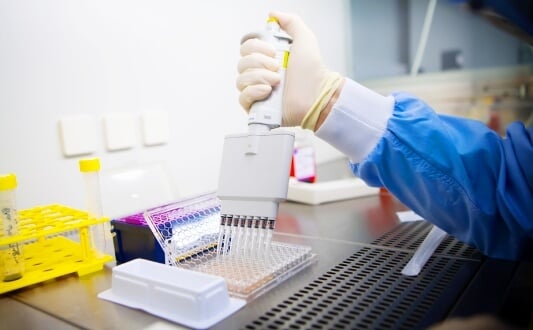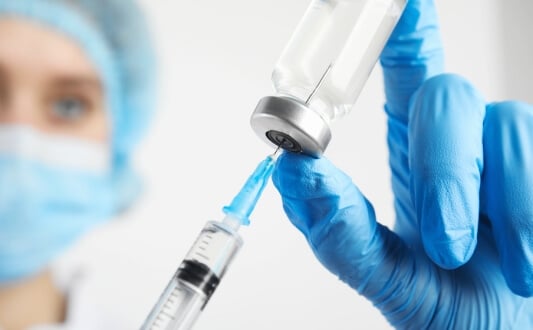If you need information about innovative PSMA therapy with Lutetium-177 for metastatic prostate cancer, you can find it
Prostate cancer can be treated in many different ways. Most often, surgical treatment, remote radiation therapy, brachytherapy and hormonal treatment are used. Let's talk about all these therapies and discuss how prostate cancer is treated at different stages of the oncologic process. Treatment of prostate cancer abroad offers sparing surgical techniques, innovative drugs and treatment with radiopharmaceuticals.
Prostate cancer treatment by stages
Stage of the pathological process dictates what is the best way to treat prostate cancer in males. This disease is characterized in most cases by a favorable course, comparing with other oncologic pathologies. Patients are able to live for decades after the diagnosis. Many of them eventually die from causes not related to prostate cancer.
How to treat stage 1 prostate cancer?
They often use a strategy of passive observation on the first stage of prostate cancer. A man undergoes examination from time to time to determine how the tumor behaves. But treatment is usually not applied immediately after the diagnostics completion, because it in itself carries certain health risks.
Observation is indicated in such cases:
- Concomitant diseases that make the operation dangerous
- The expected duration of the patient’s life expectancy is less than 10 years
- Highly differentiated tumor (characterized by a very slow growth)
Hormonal therapy alone can be used for stage 1 of prostate cancer treatment. It is proved that if it is prescribed immediately, the tumor-specific survival of patients’ increases, in comparison with delayed treatment. But even at stage 1, surgery or radiotherapy can be used. This is required if a young patient wishes to fully recover from cancer, without waiting for the progression of the tumor process.
How to treat stage 2 prostate cancer?
The tumor is still confined to the prostate gland at stage 2 of prostate cancer and does not go beyond it. But the risk that the neoplasm will spread is much higher. Often, patients ask whether it is possible to cure prostate cancer of stage 2. Yes, prostate cancer is curable at stage 2. The preferred method is removal of the prostate gland. Treatment of prostate cancer with da Vinci prostatectomy poses minimal health risks and provides curative therapy.
Nonetheless, prostatectomy is not always the way to treat a patient. Both doctor and a patient decide how to treat stage 2 prostate cancer. Atold age surgery can be more dangerous than a tumor in the presence of severe somatic diseases. Therefore, a strategy of passive observation is often applied at stage 2. However, if the patient's expected life expectancy is high, preference is given to surgical treatment and radiation therapy.
A list of treatment options that are applied in stage 2:
- Prostatectomy
- Prostate removal plus radiation (if PSA is elevated a few months after surgery)
- Distant radiation therapy
- Brachytherapy
- Brachytherapy and distant radiation
All the methods listed above can be combined with hormonal therapy. It is prescribed for several months. Hormonal therapy is obligatory with a high chance of recurrence (it is estimated by the Gleason score and PSA score).
How to treat stage 3 prostate cancer?
The tumor spreads beyond the prostate gland at stage 3 of prostate cancer. But, it still does not reach the bladder and has no distant metastases. The answer to the question, whether it is possible to cure prostate cancer of stage 3, is ambiguous. The risk of relapse after treatment is much higher than in the earlier stages.
Here are some options for how to treat stage 3 prostate cancer:
- Distant radiation therapy plus hormonal therapy
- Brachytherapy, distant radiation therapy plus a short course of hormonal therapy
- Removal of the prostate gland, pelvic lymph nodes, and then a course of remote irradiation
The operation is not always applied. Older men can only use hormonal therapy. The best way to treat prostate cancer of stage 3, is solved individually, based on the patient's age, concomitant pathology, one’s wishes, and the clinical course of the disease and the histological structure of the tumor.
How to treat stage 4 prostate cancer?
At the last stage, the tumor spreads to the bladder or the rectum, it can give distant metastases. Since it is impossible to cure prostate cancer stage 4, preference is given to systemic methods of treatment.
Possible options for treating stage 4 prostate cancer are:
- Combination of chemotherapy and hormonal treatment
- Radiation therapy, brachytherapy and hormonal therapy
- Radical prostatectomy combined with remote irradiation (in this way, prostate cancer of stage 4 treatment is provided in the absence of distant metastases)
- Transurethral resection of the prostate (to reduce symptoms, eliminate urine retention)
Sometimes patients ask if it is possible to cure prostate cancer stage 4. If it is a complete treatment of the disease, then the answer is definitely negative. The disease treatment is impossible at this stage. Nevertheless, the situation is not as hopeless as with other types of cancer with this oncopathology. It is possible to prolong a patient’s life expectancy. There are many things that can be done with prostate cancer of the last stage, such as irradiation of metastases, using bisphosphonates for the bone damage or using radionuclide treatment methods.
In recent years, the new treatment of prostate cancer with metastasis – Lutetium-177 PSMA therapy has been applied in Germany. The method makes possible reducing the volume of tumor tissue throughout the body, regardless of the location of the metastases. Another option of radionuclide treatment is PSMA therapy with Actinium-225.
These radionuclides are used in different clinical situations. The separate article is devoted to comparing the effectiveness of drugs for the treatment of advanced prostate cancer .
In each case, the best way to treat prostate cancer stage 4 is solved individually. There are many methods of therapy. They differ in cost, tolerability and have a certain risk of complications. Therefore, when choosing the optimal treatment regimen, the patient's health status, the presence or absence of symptoms of prostate cancer, as well as the patient's wishes are taken into account.

Radiation therapy for prostate cancer
Radiation therapy is one of the key ways of treating prostate cancer. Radiation therapy for prostate cancer is done in a variety of ways. It can be contact or remote (distant). In its turn, distant radiation therapy for prostate cancer can be divided into photon and corpuscular. The photon therapy is most often used because it is less expensive and is available in most clinics.
There are several methods of photon radiotherapy:
- Conventional (standard distant radiation therapy)
- 3D –conformal
- With intensity modulation
Radiation therapy is regarded not only as an additive, but also as an independent method of treating prostate cancer. A complete cure of the disease is possible with its help. Patients often ask the doctor if it is possible to cure prostate cancer without surgery. Yes, you can cure the disease, and for this, radiation therapy is used. Remote radiation therapy has both advantages and disadvantages.
The main advantages are:
- Chance for a complete recovery(the best way to treat prostate cancer without surgery)
- Absence of long recovery
- Risk of complications is lower than with surgery
- Provided on an outpatient basis (no need inhospitalization)
At the same time, there are disadvantages. Among them are:
- Difficulty in assessing the effectiveness of therapy
- The course lasts up to 2 months
- There is no way to accurately establish the stage of the pathological process
- Concomitant benign prostatic hyperplasia is not eliminated
- More than half of the patients develop erectile dysfunction
Radiation therapy has contraindications. This is a pronounced obesity, inflammatory processes in the intestine, a permanent catheter in the urethra, and a low capacity of the bladder.
If there are relative contraindications, it is better to use 3D-conformal radiation therapy. It is available in major German hospitals. In this case, the radiation repeats the curvature of the tumor, and the surrounding tissues, including the bladder and intestine, receive a minimum of radiation.
Brachytherapy for prostate cancer
Another effective method is brachytherapy for prostate cancer treatment, which is constant (low-dose) or temporary (high-dose). Needles are introduced into the prostate gland with radioactive granules placed in there.
The advantages of the method are:
- Comparing with remote irradiation, contact radiation therapy (brachytherapy) irradiates surrounding tissues less
- The procedure is carried out once and does not require hospitalization
- Erection persists in most cases
- The risk of urinary incontinence is minimal to the patients who have not previously been operated on
Brachytherapy with prostate cancer is often used as the only method of treatment. In this case, the operation is not required. The question of what to do for prostate cancer, surgery or brachytherapy, is decided in favor of contact radiation therapy with a good or intermediate prognosis. Since in this case the results of treatment are not inferior to those in surgical intervention, but the safety of the procedure and its tolerability is higher. But with a poor prognosis and spread of the tumor beyond the prostate gland, radical prostatectomy is more preferred method of treatment.
Hormonal therapy for prostate cancer
Hormonal treatment for prostate cancer is one of the most effective ways of treatment. It can be provided in various ways: surgical and with a course of medication.
Hormonal therapy options are:
- Surgical removal of testicles. This stops the production of male hormones.
- The use of drugs whichreduce the formation of androgens and the degree of exposure to the male body (using estrogens, anti-androgens, LHRH agonists) is another good way to treat prostate cancer without surgery.
All types of hormonal treatment are very effective. Within 1 to 2 years, such therapy can achieve stabilization or remission of the disease in 90% of patients. But over time, its effectiveness is weakening. Then chemotherapy is prescribed for prostate cancer. It is used in the case of a hormone-refractory tumor. Consequently, tissues of the neoplasm cease to depend on the level of androgens in the blood.
Is it possible to completely cure prostate cancer?
A common question from the patients after they find out their diagnosis is whether prostate cancer can be cured. Yes, it is possible. Moreover, the cure can be achieved in most patients, but only during stages 1 and 2. At 3-4 stages in most cases, the disease cannot be cured. If radiation therapy or surgery is performed at stages 1 or 2, then the 5-year disease-free survival in different countries rangesfrom 70 to 90%.
Often it depends on where and how you are treated:
- Whether prostate cancer will return in the future
- Whether the erectile function will persist
- Will there be complications of treatment, such as urinary incontinence, persistent hematuria (blood in the urine), etc.
To get better results of therapy, it is better to undergo treatment in Germany. In this country, the most modern operations and the best methods of radiation therapy are available, as well as the newest methods of treating prostate cancer with metastases that have no analogues in the world. Thousands of patients annually come here to receive treatment and rehabilitation in the sphere of urology.
Hospitals and costs of treatment
Prostate cancer treatment is carried out at large multidisciplinary hospitals and small medical centers that specialize in urological oncology. Among the hospitals that demonstrate high success rates in the treatment of prostate cancer are:
- Helios Hospital Berlin-Buch, Department of Urology
- University Hospital of Ludwig-Maximilian University of Munich, Department of Adult and Pediatric Urology
- University Hospital Ulm, Department of Adult and Pediatric Urology
- Urology Hospital Munich-Planegg Munich, Department of Adult and Pediatric Urology
- Charite University Hospital Berlin, Department of Adult and Pediatric Urology
The cost of prostate cancer treatment is determined for each man individually. The average costs of the main treatment methods are as follows:
- Nerve-sparing radical prostatectomy – €26,800
- Radical prostatectomy with da Vinci robot – €24,400
- High-intensity focused ultrasound ablation (HIFU) for prostate cancer – €27,600
- Transurethral electroresection for prostate cancer – €12,300
- Radiation therapy for prostate cancer – €33,300
- Intensity modulated radiation therapy (IMRT) for prostate cancer – €37,750
- Brachytherapy for prostate cancer (gold seed implantation) – €22,300
- Proton therapy for prostate cancer – €87,500
- PSMA therapy with Lutetium-177 for metastatic prostate cancer – €21,940
- Chemotherapy for neuroendocrine tumor of the prostate – €9,560
- Therapy with Lutetium-177-DOTATATE (Lu-177-DOTATATE) for neuroendocrine tumor (NET) of the prostate – €24,020
- Cancer rehabilitation – €1,570 per day
How to arrange treatment in Germany?
If you want to undergo treatment in Germany , Booking Health will help you in the organization of your trip. Booking Health is a medical tourism operator that offers a full package of medical and organizational services. You no longer need to think about how to choose a clinic abroad, contact its administration and agree upon a course of therapy. You don’t have to worry, which documents are needed, how to overcome the language barrier and how to get from the airport to the hospital. We are in charge of taking care of all these worries.
Besides, using our services, you can:
- Save up to 70% of the total cost for treatment and its organization
- To insure yourself against unforeseen medical cases (the cost of treatment will not increase for you, because insurance will cover the difference)
- Obtain medical advice without additional payment within 3 months after the treatment program completion
To use the services of Booking Health, fill in the application on our website and we will contact you as soon as possible.
Article menu:
- Prostate cancer treatment by stages
- How to treat stage 1 prostate cancer?
- How to treat stage 2 prostate cancer?
- How to treat stage 3 prostate cancer?
- How to treat stage 4 prostate cancer?
- Radiation therapy for prostate cancer
- Brachytherapy for prostate cancer
- Hormonal therapy for prostate cancer
- Is it possible to completely cure prostate cancer?
- Hospitals and costs of treatment
- How to arrange treatment in Germany?
Don't know where to start?
Contact Booking Health






